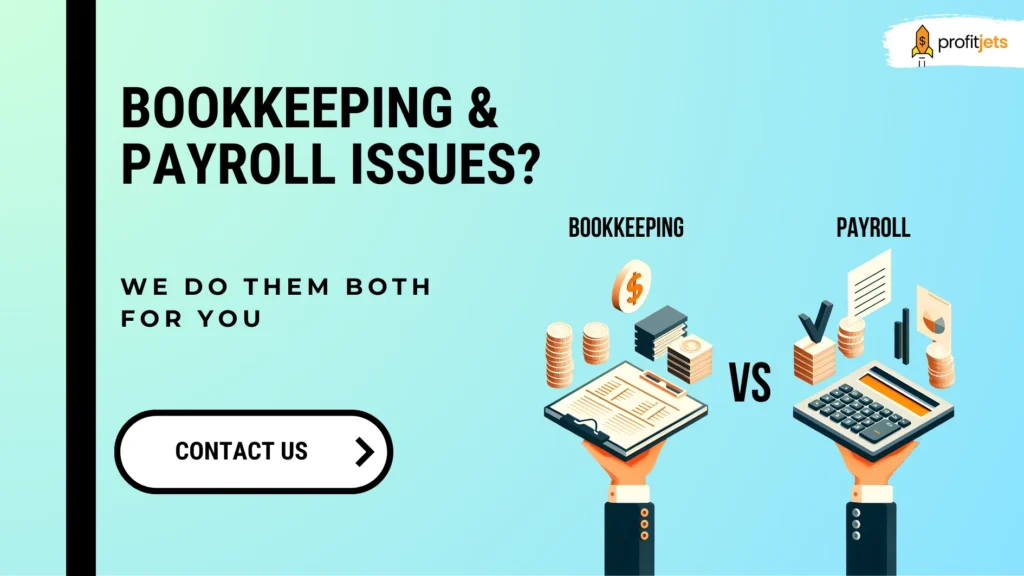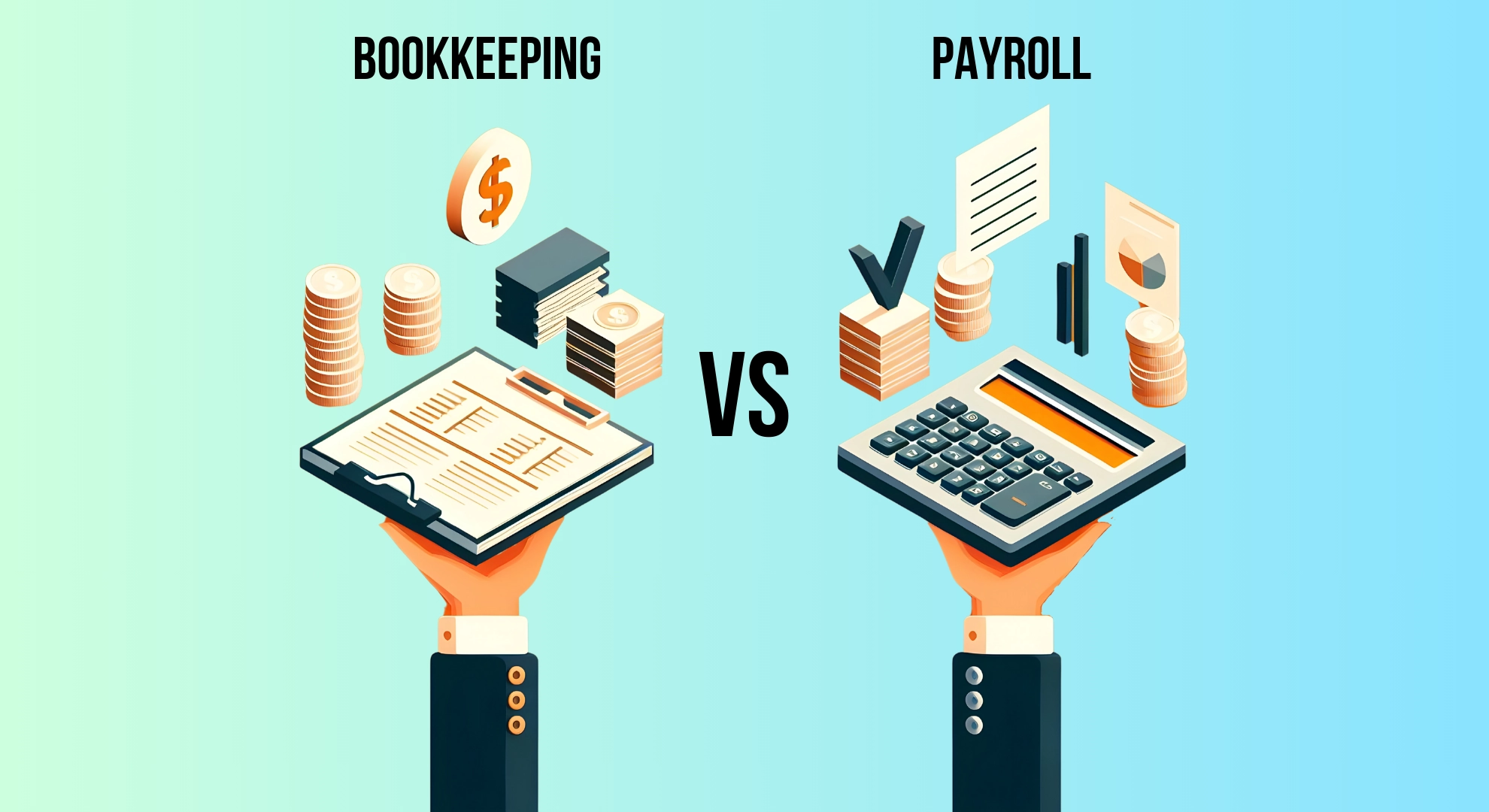Finance and accounting functions may seem interchangeable, but core distinctions exist between bookkeeping and payroll roles. Both contribute to overall business health yet focus on unique workflow needs.
Leaders should understand what sets these critical areas apart to build sound financial operations. We’ll unpack:
- Defining bookkeeping
- Defining payroll
- Respective duties
- Head-to-head comparison
Grasping the contrasts allows us to direct each activity to the correct internal owners or qualified external partners, ensuring that data remains timely and accurate.
Table of Contents
What is Bookkeeping?
Bookkeeping refers to systematically gathering and organizing all documentation tied to the financial transactions of a business on an ongoing basis. This creates an audit trail for how money enters and exits the company.
Tasks include processing invoices, bills, receipts, purchases, sales, and expenses to record amounts owed and payments rendered. Quality bookkeeping fuels upstream reporting. Activities are typically conducted daily or weekly, depending on transaction frequency.
Bookkeepers classify activities, reconcile accounts, and balance entries according to GAAP accounting standards. The complete record of transactions feeds financial statements.
What is Payroll?
Payroll refers to accurately and timely paying employee salaries and wages, along with related tax and compliance responsibilities tied to compensation.
This revolves around calculating individual paychecks reflecting hourly rates, salary-exempt statuses, bonuses, reimbursements, tax deductions, insurance contributions, and garnishments, if applicable.
The payroll’s duties include issuing payments, filing related regulatory documents, providing annual tax records, and managing tax payments related to worker compensation on behalf of the organization. Payroll work tends to spike on a biweekly or monthly basis.
What Does a Bookkeeper Do?
Bookkeepers are accountable for granular tracking of all money moving through the business, not tied directly to payroll. Common tasks include:
- Logging verified transactions like customer payments, vendor bills, bank fees, interest earned, inventory, or asset purchases in accounting software.
- Applying proper accounting classifications and entries for each record
- Reconciling accounts at the end of the month, ensuring entries match statements.
- Producing financial statements like profit and loss, balance sheets, and cash flow reports
- Following GAAP standards and adjustments
- Identifying discrepancies or irregular transactions for investigation
- Providing supporting documents for audits
Bookkeeper responsibilities demand attention to detail, organization, communication skills, and analysis capabilities, translating raw data into usable information through reporting.
What Does a Payroll Professional Do?
Payroll professionals handle everything related to employee compensation. On a routine basis, typical payroll duties include:
- Calculating individual and collective paychecks reflecting hours worked, reimbursements owed, tax obligations, voluntary deductions, garnishments, and other pay factors
- Executing direct deposit or check payments properly on scheduled pay dates
- Preparing quarterly and annual filings like tax forms W-2 and 1099s
- Remitting proper income, Social Security, and Medicare taxes
- Adjusting payroll records via timesheet audits, ensuring accuracy
- Researching and complying with evolving tax laws
- Generating apt payroll reports for compensation analysis tied to planning
Payroll must maintain meticulous awareness by cross-referencing company policies, employment terms, and tax codes.

Bookkeeping vs Payroll – Key Differences
While bookkeeping and payroll support overall finance health, they diverge across processes, timing, regulations, and required skill sets.
| Category | Bookkeeping | Payroll |
| Role | Recording day-to-day transactions | Managing employee compensation |
| Focus | All money flow: revenue, expenses, assets | Strictly employee wages and tax obligations |
| Process | Ongoing transaction reconciliation | Defined pay period cycles |
| Compliance | GAAP standards, revenue codes | Federal, state/local tax laws |
| Reports | Profit & Loss, Balance Sheets, Cash Flow | Pay stubs, wages analysis |
| Software | General ledger systems | HRIS platforms, payroll processors |
| Timing | Daily/weekly | Bi-weekly/monthly pay runs |
In summary, bookkeeping and payroll services provide a holistic view of organizational finances. This service revolves around properly paying and tracking everything related to worker compensation aligned with compliance demands.
When to Outsource Bookkeeping and Payroll
Many companies find handling both functions in-house complex as transactions and employee counts grow. Capable outsourcing partners provide flexibility and oversight tailored to an organization’s changing needs over time.
Key signs it may be time to engage in outsourcing bookkeeping and payroll:
- Financial close or tax filing deadlines are consistently delayed
- Drain on internal resources better refocused on customers
- Lack of specialized knowledge as laws/codes evolve
- Need elevated analysis and insights from the data
- Manual processes prone to errors at a grander scale
Integrating Bookkeeping and Payroll Platforms
Ideally, bookkeeping and HR systems should be integrated to move payroll entries into the general ledger seamlessly. Major solutions like QuickBooks Online and Gusto, Workday, BambooHR, and Rippling automatically sync vital data like:
- Salary draws hitting bank feeds
- Paycheck batch outputs
- Tax and benefit expense itemization
Avoiding manual duplication improves accuracy, while API connections enable deeper reporting across bookkeeping, payroll, and HR data.
How Bookkeepers and Payroll Staff Collaborate
While roles differ, close collaboration between bookkeepers and payroll coordinators ensures clean handoffs. Key touch points involve:
- Grouping hourly or contractor earnings between systems
- Confirming prepayment journal alignment
- Auditing tax payment completeness
- Comparing payroll cost visibility in Profit & Loss
- Troubleshooting discrepancies with a joint audit
Documenting processes and regular check-ins reconcile transactions and resolve problems before they compound.
Maintaining quality books and seamlessly managing payroll both require meticulous attention to detail and timeliness. Leverage the right teams so these mission-critical areas fuel rather than frustrate organizational success. Modern partners make scaling easy so leaders can stay focused on progress.

Why Choose Profitjets for Your Bookkeeping and Payroll Needs?
ProfitJets is your trusted partner for all accounting and financial management needs, offering comprehensive outsourced solutions tailored to businesses of every size. Whether managing your day-to-day bookkeeping tasks or ensuring seamless payroll operations, our services are designed to help you focus on what matters most—growing your business.
We cover everything from record-to-report to procure-to-pay, ensuring accurate financial records, efficient cash flow management, and compliance with tax regulations. Need help with catching up on overdue accounts? Our Catchup Accounting services are perfect for getting your books back on track.
ProfitJets also supports CPAs with specialized Bookkeeping for CPAs solutions, ensuring their clients’ records are accurate and up to date. For strategic financial advice, our CFO Services provide expert guidance, and our Tax Services keep your business compliant while minimizing liabilities.
No matter your industry or specific requirements, ProfitJets has the expertise and tools to deliver efficient, customized solutions. Explore our specialized services, such as Outsourced Bookkeeping Services and Bookkeeping Services, to experience the difference ProfitJets can make for your business.
Ready to simplify your bookkeeping and payroll? Let ProfitJets take the reins and drive your financial success!






